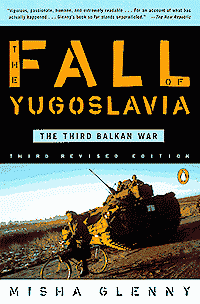|
January
11, 2001
With
a Grain of Salt
Misha
Glenny, Fall
of Yugoslavia: The Third Balkan War (London/NY, Penguin
Books, 1996, 314 pages)
 Misha
Glenny's Fall of Yugoslavia was initially published
in 1993, when the Bosnian war raged with then-unprecedented
ferocity. Europe and the US had not yet become used to images
of suffering and the tear-jerking testimonies of professional
victims that had flooded their airwaves. Out of the Balkans
came stories of horrors, some real, many fake – as if
what really happened could be exaggerated! – finding
an audience hungry for explanations more than information.
Why?, not what? was the question of the day. Misha
Glenny's Fall of Yugoslavia was initially published
in 1993, when the Bosnian war raged with then-unprecedented
ferocity. Europe and the US had not yet become used to images
of suffering and the tear-jerking testimonies of professional
victims that had flooded their airwaves. Out of the Balkans
came stories of horrors, some real, many fake – as if
what really happened could be exaggerated! – finding
an audience hungry for explanations more than information.
Why?, not what? was the question of the day.
Into such an atmosphere came a book that tried to answer both.
Glenny's Fall of Yugoslavia was suited for the role.
Written in an educated but popular language, it is not a political
analysis or a military survey of Yugoslavia's collapse. It
is rather a bit of both, bound together by emotions and a
sometimes acerbic British wit.
Though begun during the war of Croatian secession, Fall
of Yugoslavia was shaped and finished during the Bosnian
civil war. Hence, this conflict necessarily occupies a large
portion of the book. It could frequently be found in the luggage
of English-speaking reporters covering the war. Rather than
discredit the book, as the knowledge of those reporters' bias
could do, it only reinforces the staggering proportions to
which they ignored its message. For though his main points
were in line with the European public opinion of the time,
and Fall was as filled with myths as any other contemporary
book on the Balkans wars, Glenny also rejected several major
misconceptions that the Europeans – and especially Americans
– harbored. His narrative is very blunt, even condescending
in places when he berates the Western public and politicians
for getting their Balkans ABCs wrong. Though this approach
is not new to the self-righteous pseudo-historians, unlike
them Glenny backs up his opinions with facts, not the other
way around.
"Our
understanding of the war in BiH has, regrettably, been clouded
by the level of suffering and the tendency of many witnesses
to confuse the moral questions raised by the conflict with
political issues which caused it." (p.183)
For Glenny, connected emotionally with his local guides –
most of whom were urbane, English-speaking Yugoslav-oriented
people – the destruction of Yugoslavia is almost as big
a tragedy as the suffering of war. In his mind and in his
book, nationalism was something primitive, regressive and
harmful – a notion only reinforced by ethnic warfare
that followed the abolition of Socialist checks and balances.
Thus it is not surprising that he defends the idea of Yugoslavia
even as he fiercely criticizes the Serbs who professed to
defend it.
"Whatever
their tactics, the Serbs insisted on the maintenance of
Bosnia's central political mechanisms of constitutional
parity which is both just and reasonable." (p.165)
[SDS's] demand for a political solution which guaranteed
the rights that they fought for in the two world wars was
mistakenly ignored." (p. 188)
The concept that Serb war aims in Bosnia were political and
legitimate was revolutionary at the time. While American foreign
policy bore down on anything Serb as the root of all evil,
advocated armed intervention on the Muslim side and presented
the war as a Serbian "aggression" against "Bosnia," while
European mediators proposed peace plans that were at least
six months behind the events on the ground, and while their
public was being fed shocking footage of death and despair,
Glenny cut through the veneer of emotions and addressed the
issue rationally.
"The
theory that the perpetration of atrocities is a central
war aim (of the Serbs, in particular) has gained wide currency.
This represents a failure of historical understanding which
has led to a frequently crass interpretation on the part
of the international players involved in the current drama.
It has often been encouraged by the local authors to further
their political ends, and together, this has ensured that,
on the whole, the nebulous blob, which parades under the
epithet 'the international community,' has contributed to
a worsening of the crisis. In order to comprehend the atrocities,
we must understand the politics, and not the other way around."
(p. 183-4)
|